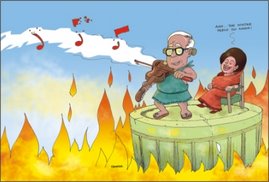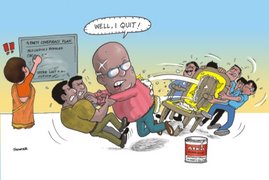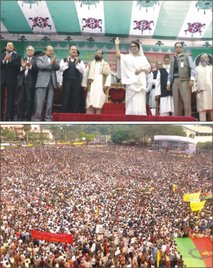
Chief Adviser (CA) to the Caretaker Government, Fakhruddin Ahmed in his first meeting with secretaries to the ministries yesterday asked the secretaries to be neutral and honest in their duties and support him in bringing back the people trust in bureaucrats. He also warned them of severe punitive measures if they fail to remain impartial.
In the meeting, pointing out that tax paid by the citizens pay for government officials' wages and also runs the government, Fakhruddin stressed that "Government officials have to remember that no political party is their master. They are the servants of the people's republic" and all officials have to ensure that the government services are delivered to the people's doorsteps. He assured that whatever changes are required to ensure impartiality in the administration, will be brought into existence. Fakhruddin said that "The responsibility of running the country lies with a government elected by the people, and he requested the officials to assist the council of advisers in fulfilling the prerequisites for holding an election, namely the people's trust in the administration.
Addressing the secretaries he said that the caretaker government will do all it can to revitalise all sectors of the economy. Emphasising the need for strengthening the power sector, the CA said all steps should be taken immediately to ensure power supply to factories, offices and households. Commenting on the improved law and order situation over the past week, Fakhruddin said the caretaker government is resolute in making it sustainable to ensure public security.
The CA praised small farmers for sustaining the country, and said they have been let down by the lack of assistance from the government, especially regarding supply of fertilisers. He also said relationships with friendly countries should be strengthened and steps should be taken to brighten Bangladesh's image abroad. The CA urged the secretaries to be more proactive in ensuring implementation of ongoing development projects and said that "any delay or failure in implementing projects will not be tolerated". Fakhruddins's meeting with the secretaries was held at Bangladesh Secretariat and longed for about two hours, where he later spent hours in his own office.
 Justice MA Aziz
Justice MA Aziz 








